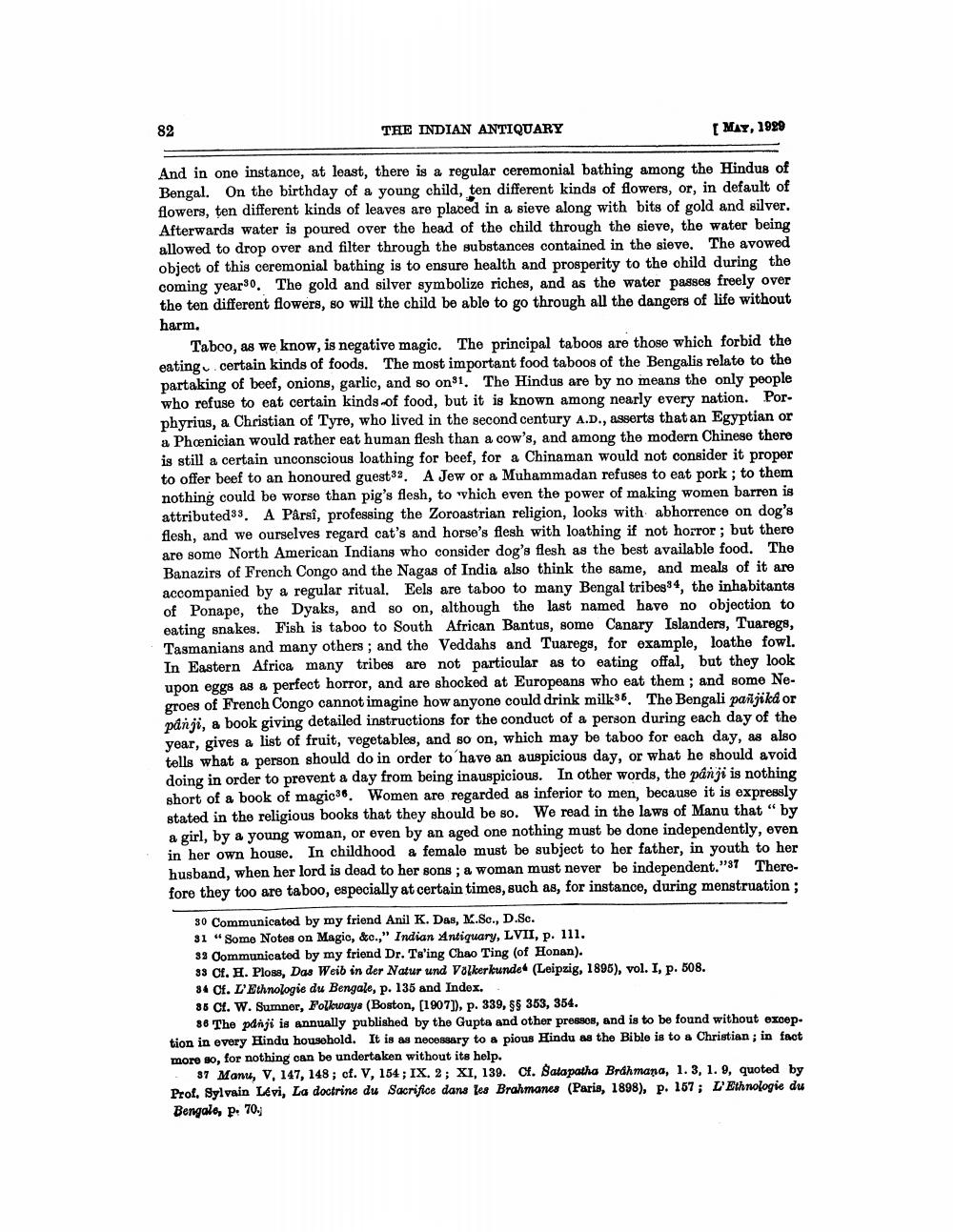________________
82
THE INDIAN ANTIQUARY
[MAY, 1929
And in one instance, at least, there is a regular ceremonial bathing among the Hindus of Bengal. On the birthday of a young child, ten different kinds of flowers, or, in default of flowers, ten different kinds of leaves are placed in a sieve along with bits of gold and silver. Afterwards water is poured over the head of the child through the sieve, the water being allowed to drop over and filter through the substances contained in the sieve. The avowed object of this ceremonial bathing is to ensure health and prosperity to the child during the coming years. The gold and silver symbolize riches, and as the water passes freely over the ten different flowers, so will the child be able to go through all the dangers of life without harm.
Taboo, as we know, is negative magic. The principal taboos are those which forbid the eating certain kinds of foods. The most important food taboos of the Bengalis relate to the partaking of beef, onions, garlic, and so on. The Hindus are by no means the only people who refuse to eat certain kinds of food, but it is known among nearly every nation. Porphyrius, a Christian of Tyre, who lived in the second century A.D., asserts that an Egyptian or a Phænician would rather eat human flesh than a cow's, and among the modern Chinese there is still a certain unconscious loathing for beef, for a Chinaman would not consider it proper to offer beef to an honoured guest32. A Jew or a Muhammadan refuses to eat pork; to them nothing could be worse than pig's flesh, to which even the power of making women barren is attributed83. A Parsi, professing the Zoroastrian religion, looks with abhorrence on dog's flesh, and we ourselves regard cat's and horse's flesh with loathing if not horror; but there are some North American Indians who consider dog's flesh as the best available food. The Banazirs of French Congo and the Nagas of India also think the same, and meals of it are accompanied by a regular ritual. Eels are taboo to many Bengal tribes84, the inhabitants of Ponape, the Dyaks, and so on, although the last named have no objection to eating snakes. Fish is taboo to South African Bantus, some Canary Islanders, Tuaregs, Tasmanians and many others; and the Veddahs and Tuaregg, for example, loathe fowl. In Eastern Africa many tribes are not particular as to eating offal, but they look upon eggs as a perfect horror, and are shocked at Europeans who eat them; and some Negroes of French Congo cannot imagine how anyone could drink milk36, The Bengali pailjikd or panji, a book giving detailed instructions for the conduct of a person during each day of the year, gives a list of fruit, vegetables, and so on, which may be taboo for each day, as also tells what a person should do in order to have an auspicious day, or what he should avoid doing in order to prevent a day from being inauspicious. In other words, the pánji is nothing short of a book of magic36. Women are regarded as inferior to men, because it is expressly stated in the religious books that they should be so. We read in the laws of Manu that "by a girl, by a young woman, or even by an aged one nothing must be done independently, even in her own house. In childhood a female must be subject to her father, in youth to her husband, when her lord is dead to her sons; a woman must never be independent."37 Therefore they too are taboo, especially at certain times, such as, for instance, during menstruation;
30 Communicated by my friend Anil K. Das, M.Sc., D.Sc. 31 "Some Notes on Magic, &c.," Indian Antiquary, LVII, p. 111. 39 Communicated by my friend Dr. Ts'ing Chao Ting (of Honan). 33 Cf. H. Ploss, Das Weib in der Natur und Völkerkunde (Leipzig, 1895), vol. I, p. 508. 34 Of. L'Ethnologie du Bengale, p. 135 and Index.. 88 Cl. W. Sumner, Followays (Boston, [1907]), p. 339, 95 363, 354.
88 The pdnji is annually published by the Gupta and other presses, and is to be found without excep. tion in overy Hindu household. It is as necessary to a pious Hindu as the Bible is to a Christian; in fact more so, for nothing can be undertaken without its help.
37 Manu, V, 147, 148; cf. v, 154 ; IX. 2; XI, 139. Cf. Satapatha Brdhmana, 1.3, 1. 9, quoted by Prof. Sylvain Lévi, La doctrine du Sacrifice dans les Brahmanes (Paris, 1898), p. 167; L'Ethnologie du Bengalo, p. 70.




